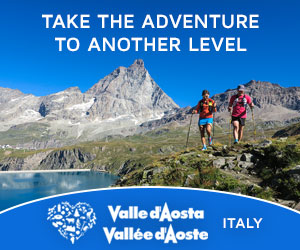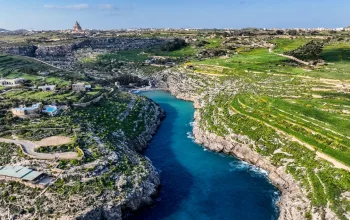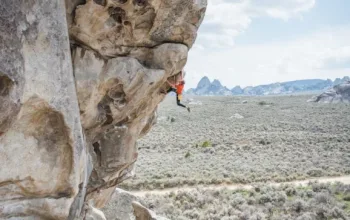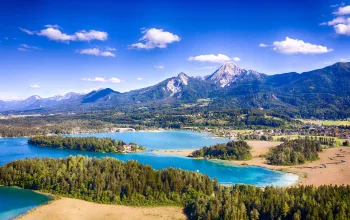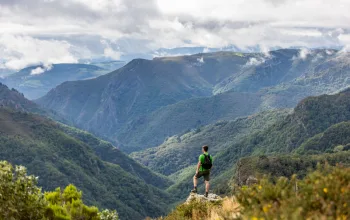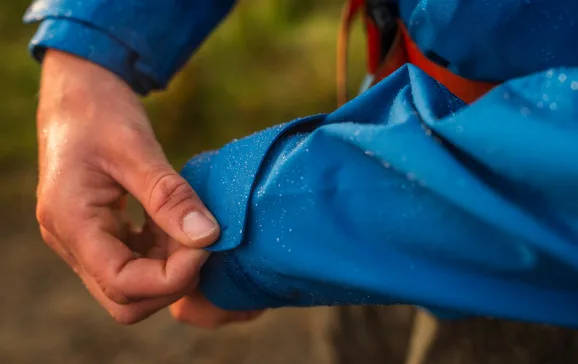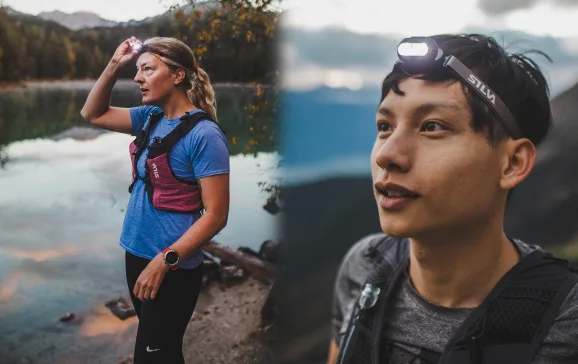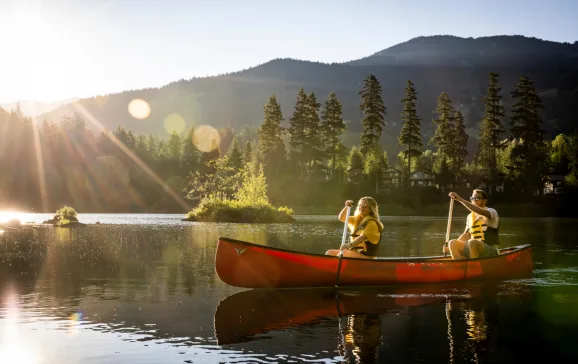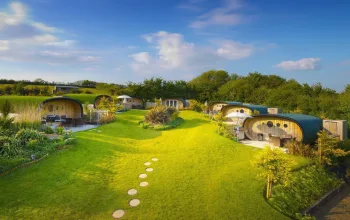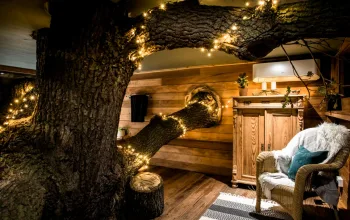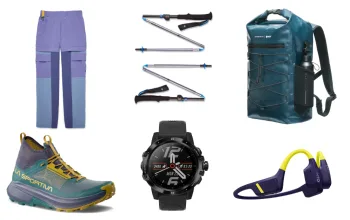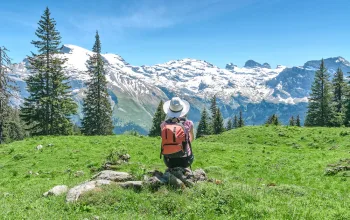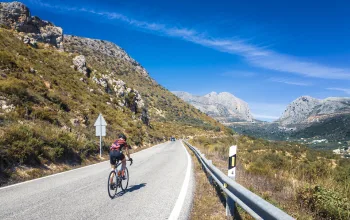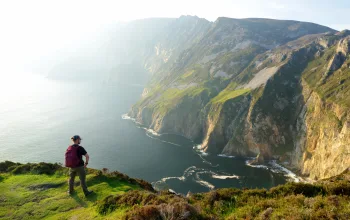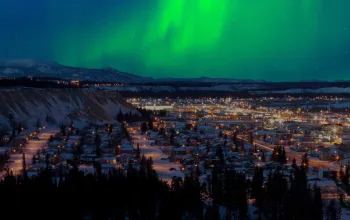As a hiker, and a British one at that, I count myself among one of the hardiest subgroups of outdoors lovers in the world. But in the Andorran Pyrenees I'm flagging by mid-morning as the mercury nudges the mid-thirties centigrade and there isn't a cloud in the sky. Perhaps us Brits need rain to power us, or maybe the rustle of GoreTex delivers subliminal messages of motivation? I cock an ear to my rucksack and hear nothing from the deeply stashed and entirely unnecessary jacket. I'm on my own.
Well not quite; Mark, my Zambian guide, moves slowly and relentlessly through the heat, with two more sun-bewildered Brits making up our small party.
And there's the ubiquitous grass - you know, the stuff which on a British summer's day is as soft as a fluffy pillow, especially after a glass or two of Pimms? Apparently Andorran grass draws its good humour from the rain, and I now realise why each stem is called a 'blade'. Every blade attacks my legs with the ferocity that only plantlife in arid places can possess. How can grass be so sharp? If they ever make a haystack of it they'll have no trouble finding a needle...
If my determination comes from rain, fortunately my good humour comes from a dose of vitamin D, and the sun is raining that down on us. So while my body is struggling, my spirits are soaring; similar to the way you can find great amusement in your own inability to function while drunk.
There's another motivating factor that fog-free air can deliver; views to every horizon. It has been a long slog from the village of Bordes d'Envalira, but late-morning we crest a ridge at Port Dret (which means steep border), suprising a pair of roe deer from their slumber, and suddenly an entire country lies before our eyes.
A kingdom at your feet
We are following a two-day section of the Grand Route du Pays (GRP) which encircles the whole country of Andorra in a mere 120 km hike. Although we are in the far north east of the country the western horizon is on Spanish soil, clear across Andorra, and France is a stone's throw to the east.
This morning we had set off from the capital, Andorra la Vella with a 20 minute drive to the small village of Bordes d'Envalira. We have a full day's walking ahead of us to reach the refuge at 2313 metres, and from Port Dret I can see the intimidating ups and downs to come.
Opposite is the peak of Cap del Port, and a traverse around the ridge and a short sharp climb puts us on its summit in a lofty lunch spot. Over sandwiches, Mark points out the route of the GRP. I can cast an eye over the extent of Andorra without blinking, but as Mark describes the ups and downs, and cranes his body around to trace the route with a finger tip, it becomes clear the GRP is a serious undertaking. It can be split into seven sections, with hut accommodation each night, but every one of those days would be long and arduous, with huge elevation gains. The alternative is to take a few extra days, but carry tent, sleeping bag, food etc.. With frequent afternoon thunderstorms in the summer months, even the most basic refugi is probably a luxury worth pushing on to.
From our vantage point on Cap del Port we can see Estany del Siscaro below - a lake that shines like an oasis, surrounded by verdant marshland. It looks like a welcome descent into a fresher climate, but the downhill turns out to be a knee-trembler.
Once we reach the flatter terrain of this hanging valley though, it feels like we've gone back a season; the snow has lingered longer here and Mark explains that it only melted a couple of weeks earlier, resulting in myriad streams and overdue spring flowers such as Trumpet Gentians and Alpenrose. It feels refreshing to see colour and hear running water and we relax at the Refugi del Siscaro watching the long marsh grasses swaying in the breeze.
Our destination this evening is the Refugi de Jucla, which is apparently just around the corner. But that corner is the steep, boulder-strewn shoulder of Tosa de Jucla - Tosa means flat peak - and the highlight of the day. After the verdant respite of Estany del Siscaro, the climb is a sharp reacquaintance with the arid and golden environment, but this time the colours come not from gnarled plant life but from an endless expanse of rock.
In places the boulders seems to defy gravity to cling to the steep sides of the mountain, and everywhere they give character to the trail, bridging and barring our path and adding a physical, clambering challenge to the walk. We may have been flirting with heat exhaustion but a change is as good as a rest, and the hands-on effect of semi-scrambling gives me a new lease of life while the increasing exposure gives me a renewed wariness of death.
We reach Refugi de Jucla late afternoon as the golden light is intensifying and the hanging valley, backed by Andorra's largest lake and flanked by more golden rock, is bathed in it. Multi-tiered pools of still water and stands of Willowherb create the impression of a landscaped garden, designed for watching the sunset from.
Nature wins
Sitting down to take in the view, I realise that it is less than 24 hours since I arrived in the capital of Andorra la Vella, and yet I've already had an intensive introduction to the twin pillars of modern Andorran culture; mountains and money.
At first glance the capital was everything Refugi de Jucla is not; a claustrophobic monument to duty-free shopping, hemmed in by mountains and apartment blocks, choked by traffic and decorated with consumer hieroglyphics in the forms of € and %. Literally miles of streets dedicated to the acquisition of cut-price goods. But I guess it's only distasteful if the shops aren't offering something you want; I enthusiastically filled my walking boots with bargain Cuban cigars.
A short walk from the commercial centre was the Borda Estevet restaurant. A Borda is a traditional Andorran farm building, often a barn, made of stone and wood, and the Borda Estevet succeeded in bringing something calming and authentic to a city being overtaken by its own economy. Over a naturally French-influenced menu of flaked salt cod salad, terrine de Foie Gras and confit de canard, the culture shock slowed its pace. Temporarily.
On a satisfied saunter back to my hotel I was surprised to come across a packed amphitheatre bearing witness to a free performance of the world famous Cirque du Soleil. An unexpected after-dinner treat and an indication of how well Andorra values its visitors.
Stimulating as the Cirque was, the sunset from Refugi de Jucla proves to be the more spectacular show; only a few hours and miles have passed, but literally and figuratively, I am half a country away.
The refuge itself surpassed its two-star rating merely by being there; luxury is not a top-hatted doorman opening your limousine door, it is food and shelter, earned and needed. Removing my boots with a cold beer in hand was more satisfying than any full body massage, and the bunk room was a presidential suite to me; the thin salty broth, a feast. In fact there was plenty of food, including an enormous packed lunch for the following days' endeavours. 'Basic' has never felt so good.
After a peaceful night and a simple, but plentiful breakfast we set off for the second day of hiking on this bite-sized tour of a bite-sized country. The task for the day is modest, to descend down to the Vall d'Incles, following a route more popular with day-hikers wanting to access the refuge and the lake. But first we have a short sharp ascent over a small peak and even as the sun is just waking up, its heat is ever-present.
Thankfully the proximity of water always has a cooling effect, whether physical or just psychological, so eventually joining the meandering path of a stream is a welcome and picturesque relief. Further down the mountainside the stream becomes a waterfall and the spray is a perfect refreshment.
This route was also popular with the French Resistance, Mark explains, during the war, for smuggling pilots, Jews and soldiers into Spain. As we reach the valley bottom and the pretty farmland with all its attendant idyll, I realise this must have felt like a paradise to those escaping persecution.
Arriving back in Andorra la Vella later that day, is a bit more of a culture shock - not least because my phone and email mailbox are once more filled with messages demanding attention. After only 36 hours in the mountains, the tranquillity and blissful isolation - which is yet so accessible - has taken a hold which I'm not quite ready to let go of.
It's a hold that the refugi's custodians, Roger and David had clearly embraced by choosing to spend their summer in their mountain-top semi-exile - their handwritten chalk board summing up their choice for the life's simple pleasures; "No tenim Wifi. Podeu parlar entre vosaltres!!!" Even with my limited Spanish deserting me, the message was clear; "We don't have Wifi. Try talking to one another!!!"





